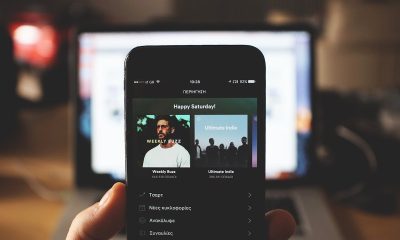Technology
Home items are getting smarter and creepier, like it or not

One day, finding an oven that just cooks food may be as tough as buying a TV that merely lets you click between channels. (File Photo: CES/Twitter)
NEW YORK —— One day, finding an oven that just cooks food may be as tough as buying a TV that merely lets you click between channels.
Internet-connected “smarts” are creeping into cars, refrigerators, thermostats, toys and just about everything else in your home. CES 2019, the gadget show opening Tuesday in Las Vegas, will showcase many of these products, including an oven that co-ordinates your recipes and a toilet that flushes with a voice command.
With every additional smart device in your home, companies are able to gather more details about your daily life. Some of that can be used to help advertisers target you —— more precisely than they could with just the smartphone you carry.
“It’s decentralized surveillance,” said Jeff Chester, executive director for the Center for Digital Democracy, a Washington-based digital privacy advocate. “We’re living in a world where we’re tethered to some online service stealthily gathering our information.”
Yet consumers so far seem to be welcoming these devices. The research firm IDC projects that 1.3 billion smart devices will ship worldwide in 2022, twice as many as 2018.
Companies say they are building these products not for snooping but for convenience, although Amazon, Google and other partners enabling the intelligence can use the details to they collect to customize their services and ads.
Whirlpool, for instance, is testing an oven whose window doubles as a display. You’ll still be able to see what’s roasting inside, but the glass can now display animation pointing to where to place the turkey for optimal cooking.
The oven can sync with your digital calendar and recommend recipes based on how much time you have. It can help co-ordinate multiple recipes, so that you’re not undercooking the side dishes in focusing too much on the entree. A camera inside lets you zoom in to see if the cheese on the lasagna has browned enough, without opening the oven door.
As for that smart toilet, Kohler’s Numi will respond to voice commands to raise or lower the lid —— or to flush. You can do it from an app, too. The company says it’s all about offering hands-free options in a setting that’s very personal for people. The toilet is also heated and can play music and the news through its speakers.
Kohler also has a tub that adjusts water temperature to your liking and a kitchen faucet that dispenses just the right amount of water for a recipe.
For the most part, consumers aren’t asking for these specific features. “We try to be innovative in ways that customers don’t think they need,” Samsung spokesman Louis Masses said.
Whirlpool said insights can come from something as simple as watching consumers open the oven door several times to check on the meal, losing heat in the process.
“They do not say to us, ‘Please tell me where to put (food) on the rack, or do algorithm-based cooking,”’ said Doug Searles, general manager for Whirlpool’s research arm, WLabs. “They tell us the results that are most important to them.”
Samsung has several voice-enabled products, including a fridge that comes with an app that lets you check on its contents while you’re grocery shopping. New this year: Samsung’s washing machines can send alerts to its TVs —— smart TVs, of course —— so you know your laundry is ready while watching Netflix
Other connected items at CES include:
—— a fishing rod that tracks your location to build an online map of where you’ve made the most catches.
—— a toothbrush that recommends where to brush more.
—— a fragrance diffuser that lets you control how your home smells from a smartphone app.
These are poised to join internet-connected security cameras, door locks and thermostats that are already on the market. The latter can work with sensors to turn the heat down automatically when you leave home.
Chester said consumers feel the need to keep up with their neighbours when they buy appliances with the smartest smarts. He said all the conveniences can be “a powerful drug to help people forget the fact that they are also being spied on.”
Gadgets with voice controls typically aren’t transmitting any data back to company servers until you activate them with a trigger word, such as “Alexa” or “OK Google.” But devices have sometimes misheard innocuous words as legitimate commands to record and send private conversations .
Even when devices work properly, commands are usually stored indefinitely. Companies can use the data to personalize experiences —— including ads. Beyond that, background conversations may be stored with the voice recordings and can resurface with hacking or as part of lawsuits or investigations.
Knowing what you cook or stock in your fridge might seem innocuous. But if insurers get hold of the data, they might charge you more for unhealthy diets, warned Paul Stephens, director of policy and advocacy at the Privacy Rights Clearinghouse in San Diego. He also said it might be possible to infer ethnicity based on foodconsumed.
Manufacturers are instead emphasizing the benefits: Data collection from the smart faucet, for instance, allows Kohler’s app to display how much water is dispensed. (Water bills typically show water use for the whole home, not individual taps.)
The market for smart devices is still small, but growing. Kohler estimates that in a few years, smart appliances will make up 10 per cent of its revenue. Though the features are initially limited to premium models —— such as the $7,000 toilet —— they should eventually appear in entry-level products, too, as costs come down.
Consider the TV. “Dumb” TVs are rare these days, as the vast majority of TVs ship with internet connections and apps, like it or not.
“It becomes a check-box item for the TV manufacturer,” said Paul Gagnon, an analyst with IHS Markit. For a dumb one, he said, you have to search for an off-brand, entry-level model with smaller screens —— or go to places in the world where streaming services aren’t common.
“Dumb” cars are also headed to the scrapyard. The research firm BI Intelligence estimates that by 2020, three out of every four cars sold worldwide will be models with connectivity. No serious incidents have occurred in the United States, Europe and Japan, but a red flag has already been raised in China, where automakers have been sharing location details of connected cars with the government.
As for TVs, Consumer Reports says many TV makers collect and share users’ viewing habits. Vizio agreed to $2.5 million in penalties in 2017 to settle cases with the Federal Trade Commission and New Jersey officials.
Consumers can decide not to enable these connections. They can also vote with their wallets, Stephens said.
“I’m a firm believer that simple is better. If you don’t need to have these so-called enhancements, don’t buy them,” he said. “Does one really need a refrigerator that keeps track of everything in it and tells you you are running out of milk?”





















